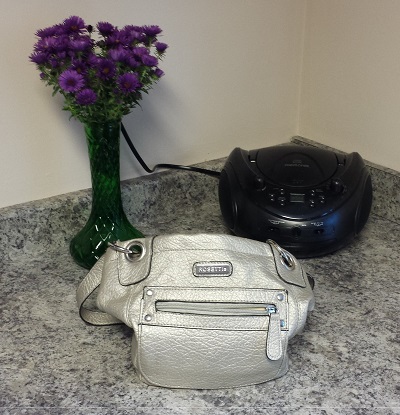Off the record, sources say that nearly 100% of the burglaries in my locale are drug-related.
 My purse was stolen in the pre-dawn dark from my kitchen counter. I know the time because I was upstairs with my cats, writing.
My purse was stolen in the pre-dawn dark from my kitchen counter. I know the time because I was upstairs with my cats, writing.
I heard a small sound different from the familiar claw taps of the neighbors’ cats, Fang and Happy, sneaking in for leftovers. My cats perked up their heads, too. Fearing a skunk visit and desiring to give time for an exit, unusually, I didn’t go downstairs to check. Every light in the front of the house was blazing and my storm door was ajar for the cats.
Incredibly, commendably, against needle-in-a-haystack odds, the police have recovered the spare car key and post office box key pinned to the inside of my purse’s zippered pocket. They’re keeping them as evidence in an on-going investigation and have asked me to say no more than that.
The Self vs. The Drug
I listened to Fiend so I can’t quote it exactly or cite the pages, but when hearing fellow addicts speak, main character Chase Daniels wonders if it’s the person talking, or the drug.
I see the same split in addiction – the self is still there, but the drug has the power.
The theft hurt me and my neighbors. I’ve mentally called the thief a name or two. Although subsiding, I still have the creeps. The cost of uncreeping has been high – paying for an additional lock on the door, modification of the too-large pet door, installation of an alarm and home security system that calls the police. The police officers’ time, the judicial system’s time – ripples and ripples of expense.
On my kitchen counter, beside my purse, were my keys – house key, car key, mailbox key – access to complete power over my vulnerabilities.
The person took my purse but left my keys.
What the Keys Mean
My little do-gooder heart wants to believe that was an act of altruism. “Sorry, ma’am, just need the money.”
But my realistic, calculating mind knows that cash makes business go faster. A cost-to-benefit analysis reveals the logistics of stealing a car and getting money for it, or returning to a house with an already-stolen purse makes keys dumpster trash. “I don’t need no stinkin’ keys.”
Whether thinking altruistically or logistically, the thief was thinking. A person who can think can change.
I have let the investigating officers know that if they arrest the thief and need me to appear in court at the person’s hearing, I will. If the person, indeed, has a drug problem, if I’m allowed, I’ll ask the judge to consider sentencing the thief to addictions treatment, not jail.
My thinking thief may be a candidate for recovery.


>I listened to Fiend so I can’t quote it exactly or cite the pages, but when hearing fellow addicts speak, main character Chase Daniels wonders if it’s the person talking, or the drug.
I remember two mentions of the self vs. the drug by Chase. I’ve studied the hardback version and can’t find the first one, but remember it this way: “I was talking to the drug, not the person.”
I did find the second one: “I wonder how much of this is dope and how much of this is him.” (p. 143)